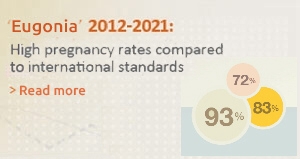Varicocele is the enlargement of the veins within the loose bag of skin that holds the testicles. It is observed in 8-22% of the general male population and is usually found on the left side. Bilateral varicocele is also frequent, while the right-sided is rare.
Diagnosis is usually confirmed with clinical examination and Doppler ultrasound while thermography, venography, scintigraphy, etc. have also been used.
Conditions such as varicocele and hydrocele (collecting fluid around the testicle) can cause infertility in men, which can be shown after a semen analysis. Surgery can improve the quality of sperm in some cases.
Various mechanisms have been implicated in the testicular dysfunction because of varicocele:
- Increase of temperature in the scrotum.
- Hormones and toxic substances retrograding.
- Increased intravascular pressure due to difficult venous drainage.
- Epididimal dysfunction due to residual conversion of testosterone to dihydrotestosterone and due to electrolyte disturbances.
- Hypoxia in the tubule epithelium, resulting in a significant influence on spermatogenesis.
Overall, it is estimated that the mechanism of spermatogenesis and endocrine disorders in varicocele is multifactorial. The increase in temperature in the scrotum, in the case of varicocele, occurs because the blood is stagnates in the venous network and therefore the testicle is overheated, which adversely affects spermatogenesis.
Varicocele treatment, despite having a very good theoretical basis, does not seem to offer the expected improvement in sperm parameters. Several researchers report about 7% improvement in sperm parameters following varicocele surgery.
The development of Medical Assisted Reproduction techniques now provides, in some cases, the possibility of avoiding surgery. The international literature (despite the objections of some) recommends to avoid surgery and apply non-invasive methods (eg insemination). Also, in cases in which IVF is required (eg due to a coexisting female factor), moderate sperm quality, by itself, is not an obstacle to in vitro fertilization.






























